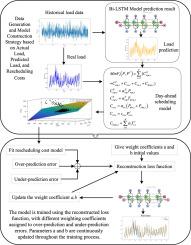重调度成本和自适应非对称误差指导矿山综合能源系统电力负荷闭环预测
IF 9.6
Q1 COMPUTER SCIENCE, ARTIFICIAL INTELLIGENCE
引用次数: 0
摘要
发展一个综合采矿能源系统,有效地回收多种资源,是实现采矿部门双重减碳目标的关键战略。准确的负荷预测是保证该系统安全高效调度的基础。然而,现有的研究往往忽视了负荷预测与调度结果之间的耦合性,将两者独立对待,这往往导致由于预测误差导致的重调度成本较高。为了解决这个问题,我们提出了一个包含重调度成本和不对称误差的闭环负荷预测算法。我们首先提出了一种数据生成和模型构建策略,通过使用实际负荷、预测负荷和重调度成本来捕捉负荷预测和重调度成本之间的关系。考虑过低预测和过度预测对调度结果的不同影响,进一步将重调度成本模型与非对称预测误差相结合,定义了基于Bi-LSTM的预测模型的损失函数。此外,设计了一种自整定非对称预测误差融合系数的优化策略,以保证负荷预测的准确性。将该算法应用于山西某煤矿综合能源系统的电力负荷预测。结果表明,该算法在保证预测精度的同时,有效降低了系统重调度成本,突出了其在矿山综合能源系统电力负荷预测中的应用潜力。本文章由计算机程序翻译,如有差异,请以英文原文为准。

Rescheduling costs and adaptive asymmetric errors guided closed-loop prediction of power loads in mine integrated energy systems
The development of an integrated energy system for mining that efficiently recycles multiple resources is a crucial strategy for achieving dual carbon reduction targets in the mining sector. Precise load forecasting is fundamental to ensuring the safe and efficient scheduling of this system. However, existing studies often overlook the coupling between load forecasting and scheduling results, treating them independently, which frequently leads to high rescheduling costs due to forecasting errors. To address this issue, we propose a closed-loop load forecasting algorithm that incorporates rescheduling costs and asymmetric errors. We first proposed a data generation and model construction strategy by using real load, predicted load, and rescheduling costs to capture the relationship between load forecasting and rescheduling costs. Considering the different impacts of under-forecasting and over-forecasting on scheduling results, the rescheduling cost model is further integrated with asymmetric prediction errors to define the loss function of the Bi-LSTM based forecasting model. Additionally, an optimization strategy for self-tuning asymmetric prediction error fusion coefficients is designed to ensure the accuracy of load forecasting. The proposed algorithm is applied to the power load forecasting of an integrated energy system in a coal mine in Shanxi. The results demonstrate the effectiveness of the algorithm in reducing system rescheduling costs while ensuring forecasting accuracy, highlighting its potential application in power load forecasting for mine integrated energy systems.
求助全文
通过发布文献求助,成功后即可免费获取论文全文。
去求助
来源期刊

Energy and AI
Engineering-Engineering (miscellaneous)
CiteScore
16.50
自引率
0.00%
发文量
64
审稿时长
56 days
 求助内容:
求助内容: 应助结果提醒方式:
应助结果提醒方式:


